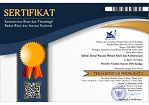Developing BMT as a loss-profit sharing-based microfinance: an Indonesian experience
Abstract
This article would like to discuss an Indonesian experience in developing Baitul Mal wat Tamwil (BMT) since 1990’s as an alternative microfinance which based on loss and profit sharing schema that realized a more just economic system. This research is conducted by both bibliographical overviews and empirical investigations. This paper would like to elaborate more on how BMT developed and maintained its capacity and efforts, in providing a more just alternative model instead of interest system which had shown negative spread and pseudo economic growth. This, however, requires emphasizing the main differences between both systems (sharing and interest). It also discusses on how BMT upgraded competitively various attractive products which based on loss and profit sharing. The establishment of BMT in Indonesia could not be separated from the emergence of “creative minority” and “enlightened group” in some campuses in Indonesia to build BMT since 1984, which later followed and developed by Indonesian Muslim Intellectual Association (Ikatan Cendekiawan Muslim Indonesia/ ICMI) since 1991. The research findings showed that the schema which is used by BMT on loss and profit sharing is a real practical effort which then has successfully developed, massively contributed and largely triggered Indonesian economic in the real sector, especially for the small and medium economic scale enterprises (SMES) in order to poverty alleviation. It also reflected as an experiment of early steps in recognizing Islamic economy in Indonesia. BMT also still could survive, even when a huge economic crisis struck Indonesia particularly and South East Asia generally in 1997.
Keywords
Full Text:
PDFReferences
Abdullah, D. V & Keon Chee. Islamic Finance Why It Makes Sense. Singapore: Marshall Cavendish Business, 2010.
Adlin Sila, Muhammad. “Lembaga Keuangan Mikro dan Pengentasan Kemiskinan: Kasus Lumbung Pitih Nagari di Padang” (Micro Finance and Poverty Alleviation: The Case of Lumbung Pitih Nagari in Padang, Indonesia). Jurnal Sosiologi Masyarakat. Vol. 15 No. 1(2010): p. 1-19.
Al-Sha’rawiy, ‘Ayid Fadhl. Al-Masharif al-Islamiyyah Dirasat ‘Ilmiyyah Fiqhiyyah lil Mumarasat al-‘Amaliyyah (Islamic Banking a Scientific Islamic Law Study on Its Operational Practice). Beirut: Dar el-Basyair el-Islamiyyah, 2007.
Azwar Karim, Adiwarman. Islamic Banking Fiqh and Financial Analysis. Jakarta: PT. Raja Grafindo Persada. 3rd Edition, 2005.
Farook, Said. “On Corporate Social Responsibility of Islamic Financial Instituions”. Islamic Economic Studies. Vol. 15 No. 1 (2007): p. 31-46.
Hossain, Mohammad Zakir. “Why Is Interest Prohibited in Islam? A Statistical Justification”. Humanomics. Vol. 25 No. 4 (2009): p. 241-253.
Khan, A.A. Islamic Microfinance Theory, Policy and Practice. Birmingham: Islamic Relief Worldwide, 2008.
Raquib, Abdur. Principle & Practice of Islamic Banking. Dhaka: Panam Press Ltd., 2007.
Ronald. The Role of Islamic Microfinance. Unpublished Dissertation. IIUM Malaysia, 2013.
Siddiqi, M.N. “Muslim Economic Thinking: A Survey of Contemporary Literature” in Studies in Islamic Economics, ed. K. Ahmad. pp. 191-269. United Kingdom: The Islamic Foundation, 1981.
Usmani, M.T. An Introduction to Islamic Finance. Karachi: Maktaba Ma’ariful Qur’an, 2002.
Widiyanto, Ismail, Abdul Ghafar., Kartiko. BMT Praktik dan Kasus. Jakarta: PT. Raja Grafindo Persada. 1st Edition, 2016.
Widiyanto, Mutamimah, Hendar. “Effectiveness of Qard Al-Hasan Financing as a Poverty Allevation Model”. Economic Journal of Emerging Markets. Vol 3 Issue 1(2011): p. 27-42
Widiyanto. Effectiveness and Sustainability of Baitul Mal Wat Tamwil Financing in the Development of Micro-Enterprises in Central Java, Indonesia. Doctoral Thesis: University Putra Malaysia, 2007.
Zouari, Zeineb. & Nabi, Mahmoud Sami. “Enhancing the Enforceability of Islamic Micro FinanceContracts in OIC Countries”. IRTI Policy Paper. Jeddah: Islamic Research and Training Institute, 2013.
DOI: https://doi.org/10.18326/ijtihad.v18i2.137-152
Refbacks
- There are currently no refbacks.

This work is licensed under a Creative Commons Attribution-ShareAlike 4.0 International License.
Ijtihad: Jurnal Wacana Hukum Islam dan Kemanusiaan by http://ijtihad.iainsalatiga.ac.id/ is licensed under a Creative Commons Attribution-ShareAlike 4.0 International License







